How Jack Murphy Helps Actors Move with Intention on “Bridgerton”
There’s a scene toward the end of the second season of “Bridgerton” when—spoiler alert— Anthony Bridgerton and Kate Sharma meet on the dance floor and finally allow their big, beautiful, almost unbearable feelings for each other to emerge. “Just keep looking at me. No one else matters,” Anthony tells Kate. And, indeed, dear reader, they can’t take their eyes off each other.
It’s in dancing moments like this that the protagonists of Netflix’s wildly successful Regency romance adaptation fall in love and find their way to happiness. The man who crafted the steps and guided the actors through them is Jack Murphy, a London-based choreographer and movement director who has worked on all three seasons of “Bridgerton”—including the highly anticipated Season 3, which premieres in two parts on May 16 and June 13—as well as the “Queen Charlotte: A Bridgerton Story” spinoff.
Murphy points to Anthony and Kate’s final dance as one of the most memorable he’s worked on thus far (along with Daphne Bridgerton and the Duke of Hastings’ dance among fireworks early in Season 1; and the moment in “Queen Charlotte” when Brimsley and Reynolds, two men, dance together atop a hill, away from society’s watchful gaze).
But don’t ask Murphy to pick his favorite. “Every dance has been special because they’re my babies,” he says. And that includes several he can’t wait to see and share in the upcoming season.
My parents met at a dance hall. I knew from a very young age about coming together through dance under extraordinary circumstances. I was born in London of Irish parents. They are a mixed marriage, Protestant and Catholic. My father joined the Royal Air Force and was stationed in Northern Ireland. He took all the men to a dance hall and met my mother. So my association with dance started with my parents. It’s always been in my blood.
The first time I ever went dancing was socially at 16. It was one of the most extraordinary moments of my life. I fell in love with being able to be free in my body in front of all these other people that wanted to be free in their bodies.
When I was interviewed for “Bridgerton,” I had already spent 30 years working—the first five years I worked as an actor, and then I retrained as a movement director and choreographer specifically to work with actors. My first job as an assistant was on the BBC’s Colin Firth “Pride and Prejudice.”
I had an extraordinary interview, chaired by [“Bridgerton” executive producer] Betsy Beers, that included me inviting [director] Julie Anne Robinson to the floor to dance to explain a quadrille. She said, “How would you teach it?” And I said, “Well, the easiest way is to get up and do it.”
When working with actors, I’m not talking about jetés. To be romantic and to be open about it, you have to be fantastically brave. I’d rather take people to a place where they have to be very brave through a terminology that they’re used to, rather than a terminology that scares the pants off them. I would ask them what would they like to nonverbally portray to the audience. I encourage them to stay rooted in the story.
The dancing there is to display the etiquette, the rituals, in order to belong. If you watch “Bridgerton” choreography, everyone’s doing the same thing at the same time, so you get a tremendous sense of belonging.
I will not let the actors move for movement’s sake. They have to move out of intent: “I want to woo you. I want to guide you. I want to seduce you. I want to impress you.”
There’s something you will see in Season 3, in Episode 4, that is extraordinary. The writers have given us this wonderful present. You’ll see a piece of storytelling in dance that is not social, but very much show dance.
We’re not just brains, we are bodies. We need to touch. And that is why I think “Bridgerton” is appealing to so many people, because there is very little social dance now. I believe fans are seeing these people being easy with each other through movement. They’re having an experience that we’re not having. You can’t get that on an app.
It’s the greatest gift in my career. There won’t be another “Bridgerton” for me. I know this is my legacy.




